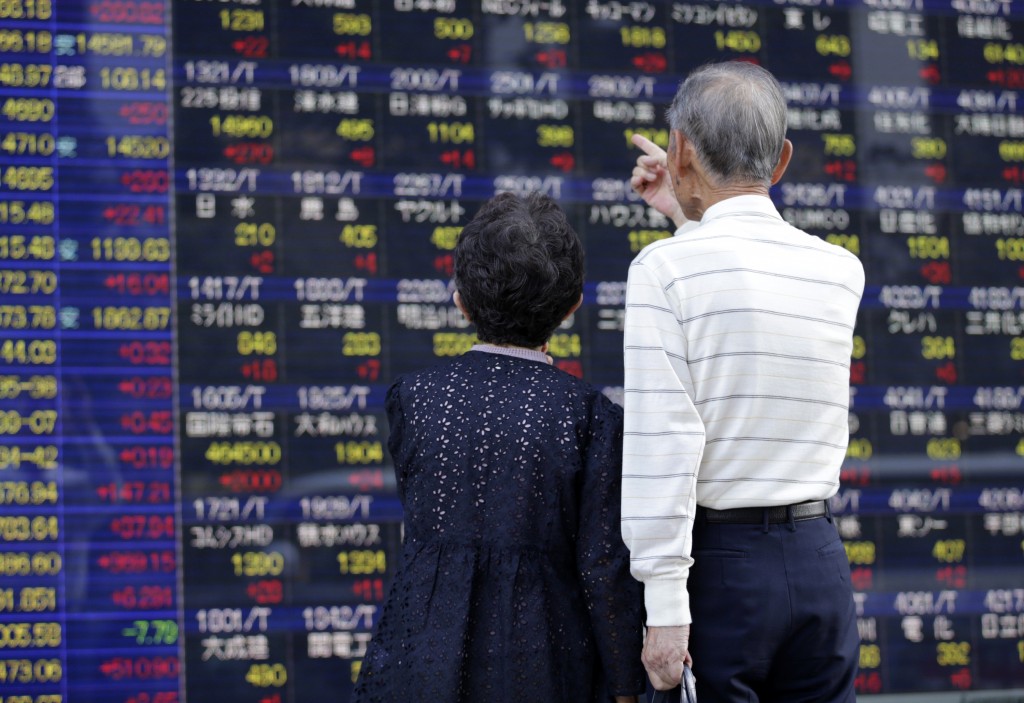
A couple watches the electronic stock board of a securities firm in Tokyo on Sept. 19, 2013. Asian shares were mixed Monday, Sept. 23, 2013, after last week’s rallies, but Shanghai saw healthy gains after better than expected Chinese manufacturing data signaled a rebound in the world’s second-largest economy. AP PHOTO/SHIZUO KAMBAYASHI
HONG KONG—Asian shares were mixed Monday after last week’s rallies, but Shanghai saw healthy gains after better than expected Chinese manufacturing data signalled a rebound in the world’s second-largest economy.
Investors took their money off the table after last week’s huge gains fueled by the US Federal Reserve’s surprise decision to leave its stimulus program unchanged.
Shanghai jumped 1.33 percent, or 29.19 points, to 2,221.04 but Hong Kong eased 0.56 percent, or 130.97 points, to 23,371.54 in shortened trade due to Typhoon Usagi.
Seoul gained 0.19 percent, or 3.83 points, to end at 2,009.41, while Sydney was down 0.46 percent, or 24.2 points, at 5,252.5.
Tokyo was shut for a public holiday.
China’s manufacturing activity expanded in September to a six-month high, banking giant HSBC said, a further sign that a recovery is gaining steam on improving demand.
HSBC said its preliminary purchasing managers’ index for the manufacturing sector in China hit 51.2 in September, the highest since March when the index stood at 51.6.
It was higher than last month’s final reading of 50.1, which improved from an 11-month low of 47.7 in July and ended three months of contraction, according to the bank. Anything above 50 is considered growth while a reading below indicates contraction.
Stock markets across the globe jumped last week following the Fed’s announcement that it would delay tapering its $85-billion-a-month bond-buying scheme.
Developing economies such as Indonesia, the Philippines and India breathed a sigh of relief after suffering a heavy sell-off in August as investors bet on the Fed winding down its quantitative easing (QE) policy.
The euro eased against the dollar on profit-taking after early gains in the wake of German Chancellor Angela Merkel’s third election victory on Sunday.
“The election has gripped international interest as the eurozone is coming out of a recession, and continuity is what the markets favor,” Kelly Teoh, market strategist at IG Markets in Singapore, said in a note.
The single currency bought $1.3510, compared with $1.3524 in New York late Friday. It bought 133.76 yen from 134.36 yen.
The dollar dipped to 98.98 yen from 99.35 yen.
Wall Street’s Friday lead was weak, with US traders growing concerned about another budget and debt ceiling standoff on Capitol Hill.
The Dow fell 1.19 percent, the S&P 500 dropped 0.72 percent and the Nasdaq lost 0.39 percent.
On oil markets, New York’s main contract, West Texas Intermediate for delivery in November rose 19 cents to $104.94. Brent North Sea crude for November rose 14 cents to $109.36.
Gold cost $1,321.80 at 1020 GMT compared with $1,357.15 Friday.
In other markets:
— Singapore fell 0.72 percent, or 23.28 points, to close at 3,214.25.
Singapore Telecom shed 1.05 percent to Sg$3.76 and DBS Bank tumbled 0.72 percent to Sg$16.62.
— Taipei rose 1.02 percent, or 83.65 points, to 8,292.83.
Taiwan Semiconductor Manufacturing Co. climbed 2.43 percent to Tw$105.5 while Hon Hai was 0.4 percent higher at Tw$76.2.
— Manila added 0.83 percent, or 53.49 points, to end at 6,477.94.
— Wellington slipped 0.61 percent, or 29.0 points, to 4,701.37.
Fletcher Building fell 0.73 percent to NZ$9.51, Internet provider Chorus slipped 0.34 percent to NZ$2.92 and Telecom was up 0.44 percent at NZ$2.28.
— Jakarta fell 0.46 percent, or 20.97 points, to 4,562.86.
Car maker Astra International fell 0.72 percent to 6,850 rupiah, while cigarette maker Gudang Garam lost 1.38 to 39,250 rupiah.
— Kuala Lumpur eased 0.30 percent, or 5.47 points, to 1,796.36.
AMMB Holdings ended 0.78 percent lower at 7.60 ringgit and Public Bank shed 0.11 percent to 17.90 but Tenaga Nasional gained 0.11 percent to 9.05 ringgit.
— Bangkok tumbled 3.37 percent, or 50.08 points, to 1,436.68.
Coal producer Banpu fell 1.36 percent to 290 baht while Thai Airways slumped 5.42 percent to 19.20 baht.
— Mumbai fell 1.79 percent, or 362.75 points, to 19,900.96.